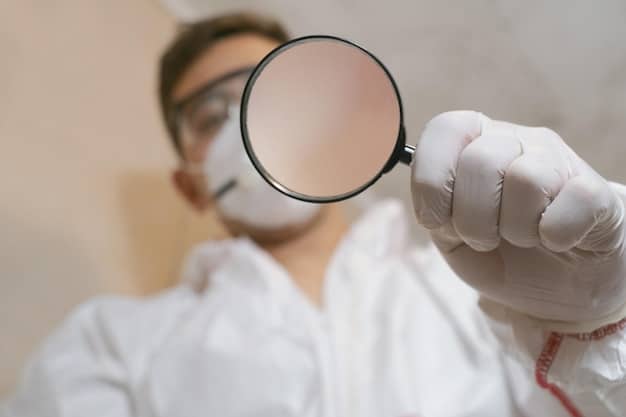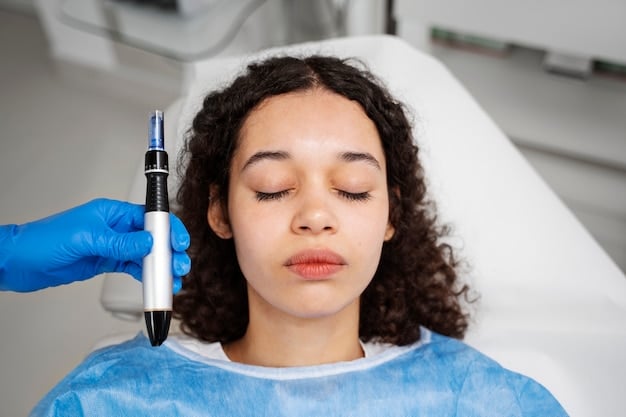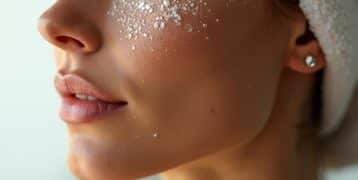Reduce Acne Scars: Dermatologist-Approved Skincare Plan

Reduce Acne Scars by 50% with This Dermatologist-Approved Skincare Plan involves a tailored approach using proven ingredients and techniques. This plan focuses on exfoliation, collagen stimulation, and consistent sun protection to significantly diminish the appearance of acne scars.
Acne scars can be a persistent reminder of past breakouts, affecting confidence and skin texture. But what if you could significantly reduce acne scars by 50% with this dermatologist-approved skincare plan? Understanding the right ingredients and consistent routine is key to achieving visible improvements.
This guide provides a step-by-step approach, featuring dermatologist-recommended products and techniques, to help you reduce acne scars by 50% with this dermatologist-approved skincare plan. Get ready to unveil smoother, clearer skin by implementing these effective strategies.
Understanding Acne Scars and Their Types
Acne scars are the result of inflammation during the healing process of acne blemishes. Understanding the different types of scars helps in choosing the appropriate treatment methods. It’s crucial to identify whether you’re dealing with atrophic or hypertrophic scars, as each requires a specific approach to minimize their appearance and reduce acne scars by 50% with this dermatologist-approved skincare plan.
Types of Acne Scars
Acne scars can be broadly categorized into atrophic and hypertrophic scars. Atrophic scars are characterized by a loss of tissue, creating depressions in the skin. Hypertrophic scars, on the other hand, involve an excess of tissue, leading to raised scars. Recognizing these distinct types is the first step toward effective treatment. Knowing this you can proceed to reduce acne scars by 50% with this dermatologist-approved skincare plan.
- Ice Pick Scars: Deep, narrow scars that resemble small, pitted holes in the skin.
- Boxcar Scars: Broad, rectangular depressions with sharply defined edges.
- Rolling Scars: Wide, shallow depressions with sloping edges, creating a wave-like appearance.
- Hypertrophic Scars: Raised, firm scars that develop due to excess collagen production.
Consulting a dermatologist can provide a precise diagnosis and tailored treatment plan to address your specific type of acne scars. This personalized approach is essential to reduce acne scars by 50% with this dermatologist-approved skincare plan. Don’t guess at a solution, find out what scar type you have and treat accordingly.

Dermatologist-Recommended Ingredients
Certain skincare ingredients are highly recommended by dermatologists for their effectiveness in reducing acne scars. These ingredients work through various mechanisms, such as promoting collagen production, exfoliating dead skin cells, and reducing inflammation. Incorporating these into your skincare routine can help reduce acne scars by 50% with this dermatologist-approved skincare plan.
Key Ingredients for Scar Reduction
Integrating key ingredients into your skincare regimen is essential for effectively reducing acne scars. These ingredients work synergistically to improve skin texture and appearance. Let’s explore some top dermatologist-recommended ingredients.
- Retinoids: Promote cell turnover and collagen production, improving skin texture and reducing the appearance of scars.
- Vitamin C: A powerful antioxidant that boosts collagen synthesis and protects against free radical damage.
- Alpha Hydroxy Acids (AHAs): Exfoliate the skin, removing dead cells and promoting new cell growth, which helps fade scars.
- Salicylic Acid: Penetrates pores to exfoliate and reduce inflammation, useful for preventing and treating acne.
Consistent use of these ingredients, as directed by a dermatologist or skincare professional, can significantly improve the appearance of acne scars. When used consistently, you’ll reduce acne scars by 50% with this dermatologist-approved skincare plan. Be sure to consult a professional about any concerns.
The Importance of Exfoliation
Exfoliation is a critical step in reducing acne scars as it removes dead skin cells and promotes cell turnover. This process helps to fade scars and improve overall skin texture. Regular exfoliation prepares the skin to better absorb other beneficial ingredients, enhancing their effectiveness. Exfoliation is an important step to reduce acne scars by 50% with this dermatologist-approved skincare plan.
Types of Exfoliation
There are two main types of exfoliation: physical and chemical. Physical exfoliation involves using abrasive materials to manually remove dead skin cells, while chemical exfoliation employs acids or enzymes to dissolve them.
Physical Exfoliation: Methods include scrubs and microdermabrasion. These techniques provide immediate results by sloughing off the top layer of dead skin cells.
Chemical Exfoliation: Involves the use of AHAs, BHAs, or enzymes to dissolve dead skin cells. Chemical exfoliants can penetrate deeper into the skin, providing more profound and longer-lasting results. This can help you reduce acne scars by 50% with this dermatologist-approved skincare plan. Look for products including ingredients like glycolic, lactic or salicylic acid.
Choosing the right type of exfoliation depends on your skin type and the severity of your acne scars. Over-exfoliating can lead to irritation and inflammation, so it’s essential to find a balance. Be gentle as you reduce acne scars by 50% with this dermatologist-approved skincare plan. Be patient and kind with your skin in order to achieve ultimate results.
Collagen Stimulation Techniques
Collagen is a vital protein that provides structure and elasticity to the skin. Stimulating collagen production can significantly improve the appearance of acne scars by filling in depressions and smoothing out the skin’s surface. Techniques like microneedling and laser therapy are effective in boosting collagen synthesis. These methods are key if you would like to reduce acne scars by 50% with this dermatologist-approved skincare plan.

Effective Collagen-Boosting Methods
- Microneedling: Involves using a device with fine needles to create micro-injuries in the skin, stimulating collagen and elastin production.
- Laser Therapy: Uses focused light to remove damaged skin cells and stimulate collagen remodeling.
- Topical Retinoids: promote collagen production, improving skin texture and reducing the appearance of scars.
These techniques can be combined with topical skincare for enhanced results. Consulting with a dermatologist will help determine the best approach for your skin type and scar severity. To reduce acne scars by 50% with this dermatologist-approved skincare plan will most likely require some additional help beyond a simple topical.
Sun Protection and Scar Prevention
Sun protection is crucial for preventing acne scars from darkening and becoming more noticeable. UV radiation can stimulate melanin production, leading to hyperpigmentation in the scarred areas. Consistent use of sunscreen helps to protect the skin and promote even healing. Protecting yourself from the sun is an important step to reduce acne scars by 50% with this dermatologist-approved skincare plan.
Choosing the Right Sunscreen
Selecting the right sunscreen involves considering factors such as SPF level, broad-spectrum protection, and skin type. A broad-spectrum sunscreen protects against both UVA and UVB rays, while an SPF of 30 or higher is recommended for adequate protection.
Mineral Sunscreens: Contain zinc oxide or titanium dioxide and are less likely to cause irritation, making them suitable for sensitive skin.
Chemical Sunscreens: Absorb UV radiation and convert it into heat, providing effective protection. Choose a formula that is non-comedogenic to prevent breakouts.
Applying sunscreen daily, even on cloudy days, is essential for preventing further damage and promoting healing. Reapply every two hours when exposed to direct sunlight. Be sure to stay dedicated to the process if you’d like to reduce acne scars by 50% with this dermatologist-approved skincare plan.
Building Your Skincare Routine
Developing a consistent skincare routine is vital for effectively reducing acne scars. This routine should include cleansing, exfoliating, treating, and protecting the skin. Tailoring your routine to your specific skin type and scar severity will yield the best results. With dedication, discipline and consistence, you can reduce acne scars by 50% with this dermatologist-approved skincare plan.
Sample Skincare Routine
Here’s a sample skincare routine incorporating dermatologist-recommended ingredients and techniques.
- Morning:
- Cleanse with a gentle cleanser.
- Apply a Vitamin C serum.
- Use a broad-spectrum sunscreen with SPF 30 or higher.
- Evening:
- Cleanse with a gentle cleanser.
- Apply a retinoid cream or serum.
- Moisturize with a non-comedogenic moisturizer.
- Weekly:
- Exfoliate with a chemical exfoliant (AHA or BHA).
Adjusting this routine based on your skin’s tolerance and response is crucial. Consulting with a dermatologist can provide personalized recommendations. Take your time and be diligent and you can reduce acne scars by 50% with this dermatologist-approved skincare plan!
| Key Point | Brief Description |
|---|---|
| ✨ Key Ingredients | Retinoids, Vitamin C, and AHAs are essential for scar reduction. |
| ☀️ Sun Protection | Daily sunscreen use prevents scars from darkening. |
| 🧪 Exfoliation | Regular exfoliation promotes cell turnover. |
| 💉 Collagen Stimulation | Microneedling and laser therapy boost collagen production. |
Frequently Asked Questions
Yes, with consistent use of dermatologist-recommended ingredients like retinoids, Vitamin C, and regular exfoliation, significant improvement is possible. The key is to adhere to a consistent skincare routine.
Exfoliate 1-2 times per week, depending on your skin’s tolerance. Over-exfoliating can cause irritation, so it’s important to find a balance that works for you, always keeping your skin type in mind.
A broad-spectrum sunscreen with an SPF of 30 or higher is ideal. Mineral sunscreens with zinc oxide or titanium dioxide are gentle and effective for preventing hyperpigmentation with the goal to reduce acne scars by 50% with this dermatologist-approved skincare plan.
Retinoids can cause dryness, redness, and peeling, especially when first introduced. Start with a low concentration and gradually increase usage. Always use a moisturizer to combat these side effects.
Results vary, but noticeable improvements typically take 2-3 months of consistent use. Be patient and persistent with your routine. Consulting with a dermatologist is always a good idea.
Conclusion
Reducing acne scars requires a comprehensive approach that includes the right ingredients, consistent routines, and sun protection. By following this dermatologist-approved skincare plan, you can significantly reduce acne scars by 50% with this dermatologist-approved skincare plan.
Remember, patience and consistency are key to achieving visible results. Tailor the routine to your skin’s needs and consult with a dermatologist for personalized advice.





